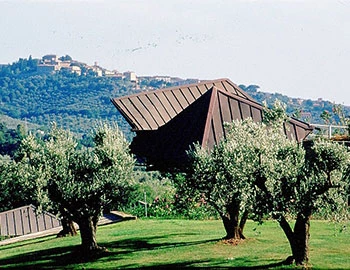Noi 4 2022
DOC Bolgheri rosso, Sette Cieli, 750 ml

| Grape variety: | Cabernet Sauvignon, Merlot, Petit Verdot, Cabernet Franc |
| Producer: | Sette Cieli |
| Origin: | Italy / Toscana |
| Other bottle sizes: | |
| Other vintages: |
Description
„Noi 4" translates with „us 4" for the 4 members of the Ratti family. Its nose is defined by hints of black current, cedar wood, mocha, violets and blond tobacco. The taste is a nice contrast between power and fine tannins
Attributes
| Origin: | Italy / Toscana |
| Grape variety: | Cabernet Sauvignon, Merlot, Petit Verdot, Cabernet Franc |
| Label: | Vegan |
| Ripening potential: | 2 to 6 years |
| Drinking temperature: | 16 to 18 °C |
| Food Pairing: | Bistecca fiorentina, T-Bone steak, Spiced grillades, Spaghetti alla bolognese, Goulash, boeuf bourguignon, Beef Stroganoff, Risotto with ceps |
| Vinification: | short must fermentation, Punching down |
| Harvest: | hand-picking, strict selection |
| Maturation: | in partly new and used barriques/ Pièces, some months bottle storage before sale |
| Bottling: | filtration |
| Maturation duration: | 19 months |
| Volume: | 14.5 % |
| Note: | Contains sulphites |
Sette Cieli
It isn’t easy to ascend to seventh heaven. And indeed, the road to the wine estate Sette Cieli is fraught with some difficulties. You might need to take a few detours (seventh heaven isn’t on Google Maps’ radar), but the Ratti family’s wine paradise is more than worth the effort.
As is so often the case in the world of wine, this winery was created as the realisation of a dream. Erika Ratti made her dream a reality by planting the first vines in 2001 high above the Bolgheri plain, the birthplace of the world-famous Bolgheri wines. The magnificent view from up there extends from Monteverdi Marittimo, surrounded by dense forests, over the plain to the Tyrrhenian Sea shimmering on the horizon – a wonderful place!

Merlot
Everybody’s darling
Merlot is the most charming member of the Bordeaux family. It shines with rich colour, fragrant fullness, velvety tannins and sweet, plummy fruit. It even makes itself easy for the vintner, as it matures without issue in cool years as well. This is in contrast to the stricter Cabernet Sauvignon, which it complements as a blending partner. Its good qualities have made the Merlot famous worldwide. At over 100,000 hectares, it is the most-planted grape in France. It also covers large areas in California, Italy, Australia and recently in Eastern Europe. The only catch is that pure Merlot varieties rarely turn out well. Its charm is often associated with a lack of substance. Only the best specimens improve with maturity. They then develop complex notes of leather and truffles. This succeeds in the top wines from the Bordeaux appellation of Pomerol and those from Ticino, among others.
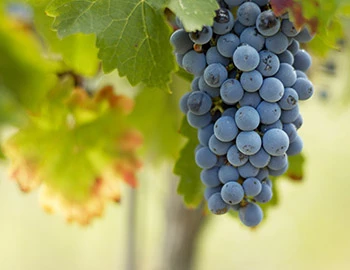
Cabernet Sauvignon
The backbone of Bordeaux
The Cabernet Sauvignon gives the Bordeaux its backbone, yielding deep violet wines with powerful tannins and endless ripening potential. It is the top dog in Médoc, and is placed in all five premier crus of Bordelais. When young, it often appears strict and unapproachable, but with advancing years, its tannins round off. It is wonderfully velvety, and yet always maintains its freshness. Typical flavours include cassis, graphite and cedar. Wherever Cabernet Sauvignon is found, Merlot is not far away. It complements the robust structure of Cabernet with softness, fruit and richness. The Cabernet Sauvignon is the most-exported vine in the world. It delivers persuasive qualities in Italy as an ingredient of the Super Tuscan, or as the flagship variety from California. There, it is lovingly titled “Cab Sauv”. Meat fans should be aware that it fantastically accompanies a grilled entrecôte. The family tree of Cabernet Sauvignon is surprising: its parents are Cabernet Franc and the white Sauvignon blanc.
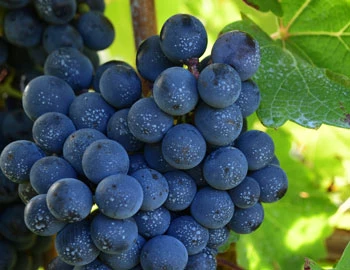
Petit Verdot
Bordeaux’s secret weapon
It is commonly said that the Petit Verdot originated in Bordeaux. But genetically, it is closer to a group of vines from near the Pyrenees, which are most likely descended from wild clematis. In French, these wild plants are called “lambrusques”, and the Petit Verdot is also known under the synonym Lumbrusquet. It is a high quality grape: very dark and spicy with notes of cassis and graphite, plenty of robust tannins and strong acidity. Most major Bordeaux contain a small proportion of Petit Verdot. Appropriately, it is valued wherever wines are produced according to the Bordeaux recipe. For example, in Italian Maremma or in California, where it covers the largest area worldwide. It is almost never vinified purely by itself. Incidentally, its name, derived from “vert”, meaning green, alludes to its Achilles heel: in cool weather it tends to form small, seedless green grapes.
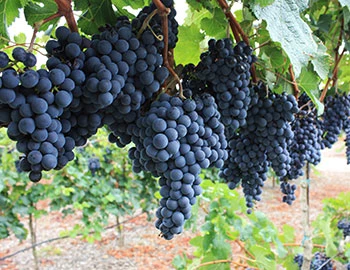
Cabernet Franc
Forefather of the Bordeaux varieties
The Cabernet Franc is one of the oldest varieties of Bordelais and a parent of three other red grapes in the Bordeaux assortment: Cabernet Sauvignon, Merlot and Carmenère. It is distinguished by its complex, flavourful bouquet of raspberry, graphite, violet, liquorice and white pepper. In addition, it presents round, crisp tannins which turn out less strongly than those of Cabernet Sauvignon. While the Cabernet Franc always appears as part of a blend in Bordeaux, it is pressed alone on the Loire. The most renowned appellations are Chinon and Bourgueil. Incidentally, the Cabernet originates not in Bordeaux but in the Spanish Basque Country. Cabernet owes its name to the Latin “carbon”, meaning black.
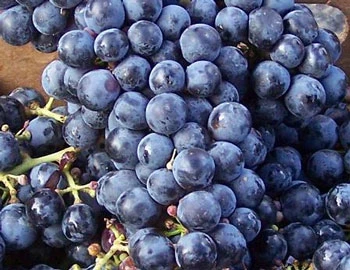
Italy
Italy – Where wine is a way of life
The Italian wine regions are extremely diverse, and this is made clear in their wines. Established varieties such as Merlot, Syrah, and Sauvignon can be found on just 15 percent of the total vine growing area. The remaining 85 percent is reserved for autochthonous, indigenous varieties. More than 2,000 different grape varieties are grown under diverse conditions and pressed with various techniques into wines that reach the top tier of the international wine market.
